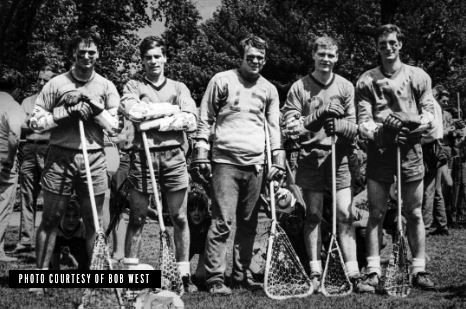As the Manhasset (N.Y.) High School players gathered for the first day of lacrosse practice in 1967, one immediate question raced through many of their minds. “Where is everyone?”
Despite finishing with a respectable 13-4 record the previous year under first-year coach Renzie Lamb, there were only a handful of players present for that first day of practice, including only five seniors.
And typical for March 1 on Long Island, the weather was cold and gray, moving practice to the parking lot behind the school, which served as the all-weather “field” when snow blanketed the grass.
“The parking lot was plowed by the school, but Coach Lamb wanted more room for us to practice, so we shoveled to make more space,” Bob Ernst said. “I think he called it bonding. We called it work!”
With the immortal words, “Let’s see what happens,” Lamb began to put the players through their paces. Lamb had inherited the program after the departure of Hall of Fame coach Richie Moran and had veteran coach Luke Belsito as his assistant. As a pair of former Marines, they shared a common mindset.
With no stars and tempered expectations, the “Fighting Fifteen”, as they came to be known, got to work. Practices emphasized fundamentals, discipline and conditioning to best prepare the players for the formidable Long Island competition that awaited them.
“Having such a small squad size, we knew that the only way we could compete was if we executed fundamentals better than our opponents, and if we were the best conditioned team we could possibly be,” said Bob West, a midfielder and co-captain.
Once the games began, the players followed Lamb’s strategy to perfection, playing ball control to maximize offensive possessions as long as possible. Faceoff man Doug Fuchs was one of the best on Long Island, and the defense, anchored by future Hall of Fame goalie Bob Rule and co-captain Vic Martocci, was stout. A honed clearing game, keyed by productive midfielders, consistently pushed the ball quickly back to the offensive side of the field.
“Our defense was strong, but only made possible by midfielders who were always there for the clears,” Martocci said.
A little luck also helped, as the team remained relatively healthy all season long.
“It is amazing, in retrospect, that we had so few injuries for the whole season,” senior attackman and co-captain Gary Piccione said. “A thinner squad would have left us even more exhausted.”
To reinforce the commitment to fundamentals, after each game Lamb made the team members run one lap around the field for each goal they allowed the opponent to score. Manhasset finished undefeated through its 14-game regular season, outscoring its opponents 101-24.

“Years later, Renzie told us that he did this to keep parents away from the players so he could talk to us first,” Tad Williams said. “He didn’t want the first thing we heard to be ‘great game’ from the parents, when he knew we always needed improvement. He wanted to be the first voice.”
Manhasset’s undefeated run continued in the postseason, with victories over Mineola, Levittown Division and Freeport to claim the Nassau County championship. Just one hurdle then remained, a showdown against Suffolk County champion Huntington for the Long Island championship. In a nip-and-tuck affair, Manhasset scored the final two goals of the game to rally for a 7-6 victory and claim the title.
Despite beginning the season with no returning starters, nearly all the members of the 1967 squad eventually went on to play collegiately, often against each other. Lamb remained at Manhasset for just one more season before moving on to coach at Williams College, where he forged a noteworthy 37-year career.
The team’s final record of 18-0 was Manhasset’s best since 1946, when records were first kept, and remained the school record until 2004.
“That 1967 team is the story of a few kids with great coaches living up to their potential despite overwhelming odds. We were a small team that produced a significant result through teamwork,” West said. “Hopefully, our story can inspire other small teams and demonstrate that great things can happen.”
ARTICLE BY USA LACROSSE
